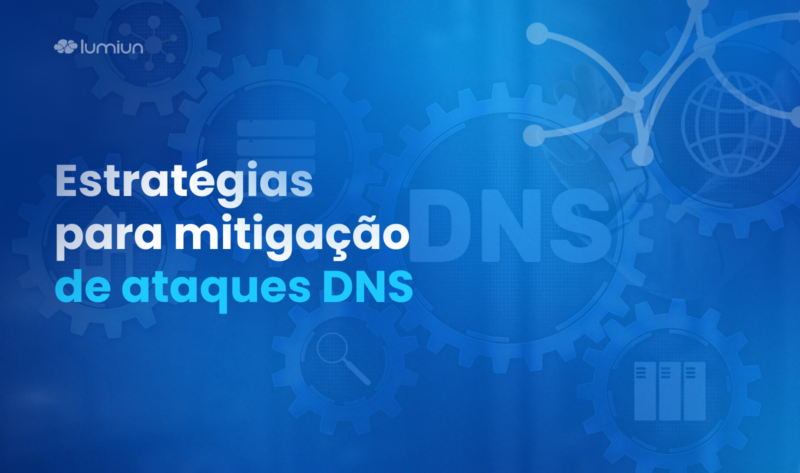Developed in the 1980s, DNS (Domain Name System) allowed the popularization of the internet and free access to ordinary users. The main objective of this feature was to increase the functionality of the internet, enabling easy access and avoiding the vulnerabilities present in this environment . However, without a major focus on security and DNS -based threats.
For this reason, over the years, the Doming Names System - DNS has become a very vulnerable resource and targeted by various types of attacks , such as amplification and denial of service and falsification of access. Fortunately, the advancement of technology has allowed the development of new strategies to optimize these attacks, making these threats a growing concern.
Understand how DNS works in practice:
According to the 2022 Global DNS Threat Report developed by IDC, about 88% of companies suffered more than one DNS attack, with an average cost of $ 942,000. The report also demonstrates that there are an average of seven attacks per year for each organization , highlighting the importance of adopting more effective security measures.
Browse the content of this article:
- Types of DNS attacks and their impacts
- Strategies for Mitigation of DNS Attacks
- Importance of continuous monitoring of DNS infrastructure
- Preserving privacy through DNS innovations
- Access control strategies and strong authentication
- The effective implementation of DNSSEC in the security strategy
- Employee Education: Defense against Phishing attacks
- Strategies to ensure resilience: backups and involvement with DNS providers
- Search for knowledge and advisory specialized in cybersecurity
- Strengthening your cyber security with Lumiun solutions
Types of DNS -based threats and their impacts
Before we understand how different types of DNS attacks can affect your organization, we need to elucidate the role of DNS attack vectors and how they are used. DNS attack vectors are strategies used by cybercriminals to directly affect a network domain name system .
The purpose of the cybercriminal, in this case, is to affect the stability and availability of DNS services or to use this tool in an even more dangerous cyberatoque strategy . The main DNS attack vectors are:
Volumetric and stealth attacks from
In this type of denial of service attack, the cybercriminal has as its main objective overloading the DNS server. This is possible by sending a large amount of simultaneous requests, which are made with the help of infected computers.
The result of this attack is the unavailability of service, where the company may suffer from reducing the response time , or even worse, with the fall of its system. The unavailable DNS server causes immense financial losses, as well as impacting the company's image to the market and consumers.
Working similarly to the denial of service attacks (Volumetric DOS attacks), the stealth attacks are more discreetly implemented. Requests are constantly sent, increasing the flow of accesses and demands of a page.
As a result, cybercriminals can exhaust processing capacity through the continuous queries that are sent, degrading or completely interrupting a company's services.
Exploration
Exploration attacks use vulnerabilities or failures that are found in a company's DNS services. These vulnerabilities allow indiscriminate access of cybercriminals and favor the incidence of other attacks.
Depending on the size of the attack, several services can be harmed at the same time and cause substantial damage to numerous companies.
Protocol violation attack
In this type of attack the goal is not to unconnect DNS servers or cause a system overload. Using DNS, cybercriminals can collect data improperly or favor the application of an intense phishing .
Protocol violation attacks are extremely dangerous mainly because they allow the application of several other cyber scams.
Considering these vectors, it is possible to determine what are the main types of attacks and how they can harm your organization. Here are the main vectors of attacks used by cybercriminals:
Denial Attack of Service -
As we say earlier, attacks and denial of services aims to flood a network to the computer to cause damage. Submitting multiple requests to the server or network, cybercriminals can overload the system and cause the unavailability of services.
This excessive demand impairs compliance with legitimate requests, impairing the company's image and causing great dissatisfaction by consumers . In addition, this type of attack causes substantial financial losses, considering that during the unavailability your company will no longer meet the real demands.
Zero -day attack
Considering the time between the identification of a problem and the development of a new update, services of services used are vulnerable to zero day attacks . Cybercriminals use these vulnerabilities that are still unknown to DNS servers to cause very harmful attacks.
These unidentified vulnerabilities are very difficult to combat, requiring a very preventive posture to avoid this type of attack.
DNS cache poisoning
DNS cache poisoning is also known as DNS forgery, being an attack on corruption or DNS cache poisoning. This means that cybercriminals replaces the registration of legitimate DNS with a malicious.
The result is that the user can be induced to deliver confidential data such as account information or access credentials. Using this information, criminals can unduly access data and confidential files.
Ddo attack
Distributed Denial Denial Attacks work similarly to the attacks of DOS. That is, the cybercriminal sends illegitimate requests to networks and servers causing traffic to cause the unavailability of services.
This flood attack causes numerous problems for the company, especially those who need their digital services to maintain business continuity. Because of this attack, the legitimate demands cannot be delivered, impairing the smooth running of the services.
DNS Amplification Attack
These attacks are focused on DNS servers that are open and publicly accessible . Criminals flood a DNS response traffic system through small illegitimate consultations.
These small consultations make the DNS server work on large answers, enabling the impact of the attack on the target.
DNS -based Mitigation Strategies
Interruption of services and systems from a company caused by DNS targets can make the company unable to be found in the digital environment. In addition, there is a great impact that this company will suffer because of its unavailability impairing its image in the market and the perception of consumers.
While on one side of the screen the user receives the not available DNS server or DNS failure, on the other hand the company is no longer accessible and visible to its potential consumers. The financial impact caused by this problem is immense and may even be irreversible depending on the organization's losses.
Although not every DNS attack is configured as a denial of service attack, most of these DNS -based threats work this way. For this reason, it is essential that the company adopts DNS attack mitigation strategies to avoid the damage caused by these threats.
There are several solutions that can be implemented in your organization to avoid these DNS -based threats and maintain the continuity of your activities. The main strategies that can be used are:
DNS protection
Being part of a DDOS prevention package, DNS protection aims to ensure that the infrastructure and services offered by a company remain available. This tool should be chosen carefully, considering that false positives have a great impact on the company.
This monitoring should be implemented along with your business traffic modeling, protecting your services and ensuring only the traffic of legitimate requests. An efficient monitoring tool will be able to differentiate legitimate and illegitimate users, avoiding improper access and recognizing zero day attack patterns.
Dnssec
DNSSEC ( Domain Name System Safety Extensions) is a security tool that helps add a DNS system protection layer. This feature works from the digital subscription of DNS records, avoiding its falsification or tampering during information transmission.
Acting proactively, this system will prevent intermed traffic redirect to pages with malicious content or DNS -based threats and traps such as phishing . This way your business will increase the authenticity and integrity of the DNS, avoiding its manipulation and redirect.
DNS Filter
The DNS filter allows the most assertive monitoring and control of web traffic. Using DNS for blocking malicious pages and filtering dangerous content, this tool helps increase data security within the company and ensure that there is more complete control over the contents that are accessed in the workplace.
Using this feature, your business will be able to prevent phishing emails, traps present in malicious pages and content that has some risk causes problems. This way, your security approach will be more complete and assertive.
firewall
Firewall is a safety feature that allows for monitoring of input and output traffic and the traffic rules based on pre-established safety rules . Thanks to its functionality, firewall is one of the main features used in cyber security in recent decades, allowing the placement of a barrier of protection between nets.
Depending on your company's goal and security strategy, you can choose a specific firewall, such as Firewall Proxy, Unified Threat Management Firewall, next -generation Irewall , among others. Choosing the ideal tool should be based on your business needs and threats that can undermine the authenticity and safety of your business.
Importance of continuous monitoring of DNS infrastructure
Considering the importance of DNS in functionality in performing numerous tasks in the digital environment, continuous monitoring is critical to increasing your business protection. Monitoring techniques continue to help optimize business safety and identify possible atypical or malicious activities proactively.
Given that cybercriminals implement increasingly efficient strategies to invade your company's systems, this monitoring becomes an indispensable factor. Using a reliable tool, your business can stay a step forward and ensure that your features and information remain increasingly protected.
It is very important that a prevention posture will be established in the face of DNS -based threats. This means that more than just solving problems when they happen, it is necessary to prepare to deal with these threats and especially to prevent them from happening.
Monitoring tools will help generate alerts for suspicious activities and ensure that these problems are blocked even before causing some kind of damage to your business. This way, your security strategy will be strengthened and your business will be able to provide more and more security for all employees, partners, and more.
Preserving privacy through DNS innovations
The advancement of technology has allowed the development of specific tools to ensure that DNS is a protected and effective resource. The translation made by the DNS system allows us to be able to access pages easily , however, there are safety aspects that must be strengthened to ensure the protection of this feature.
DNS system cryptography works based on two standards:
DNS about TLS (DOT)
The DNS on TLS, or DOT, consists of a DNS appointment encryption pattern aimed at increasing protection. This system uses the TLS security protocol, designed for encryption and authentication of communications carried out in the digital environment.
Also known as SSL, TLS ensures that DNS requests and responses are not intercepted, forged or tampered with by cybercriminals . The base of this tool is the user datagrams protocol (UDP).
DNS about https (DOH)
This type of encryption is presented as an alternative to DOT (DNS on TLS). In this case, consultations also undergo encryption, but are sent through HTTP or HTTP/2 protocols . This means that they are not sent directly on UDP.
However, it works in the same way as DOT, preventing cybercriminals from breaking, changing or forging DNS traffic. DNS on HTTPS also adds an extra layer of security to the networks and prevents them from being manipulated by criminals.
Access control strategies and strong authentication
Considering the immense impact that DNS -based threats and the action of cybercriminals can have for your business, it is of utmost importance to ensure a more efficient security strategy. Security features that were long summed into firewall and antivirus have become even more complex.
Developing strategies focused on diversion of information and invasion of networks and devices has made the need for more specific tools become increasing. For this reason, it is indispensable to adopt access control strategies and strong authentication to protect your company's networks and devices.
This means that your employees need to go through a training process and adaptation to understand the importance of adopting quality passwords to avoid their easy deduction and unauthorized users . In addition, it is indispensable to adopt multifactor authentication so that your company's critical systems are protected. In this sense, we even refer to DNS servers, which, although indispensable, also require more specific protective tools.
Access control is also a strategy that can help your business remain protected by preventing users from accessing content considered dangerous or malicious. This is because, using the lack of knowledge or extraction of users, cybercriminals implement digital traps on pages that are considered harmless, hiding files and malicious applications in banners, links, and even suspicious news.
SAFE DNS SETTINGS TO MINIMIZE RISKS
The configuration of your DNS server system should have as its main objective to increase safety and restrict malicious access. For this, there are some settings that can be implemented in your business to optimize protection:
Zone transfers restriction
DNS zone transfer is a kind of domain name server transaction. This strategy allows managers to replicate the DNS database in a set of servers using the TCP protocol.
This mechanism is used to synchronize updated data on primary DNS servers and can work in two different ways:
- Fullzone Transfer (AXFR): In this case, the primary DNS server notifies the secondary DNS server on possible changes made in a zone. When the serial number of the primary DNS is higher than the number in the secondary , the zone file will be copied to secondary DNS servers.
- Incremental Zone Transfer (IXFR): The primary DNS server notifies the secondary DNS server on changes made in a specific zone. When the serial number in the primary DNS is higher than the secondary present, these changes are compared and only the records that have been changed are copied
It is possible to establish a safer zone transfer by restricting IP address or DNS transfer signature.
LIMITATION OF APPLICATION
Limitation of recursion will prevent the DNS network from conducting recursive queries by avoiding the response to any IP query. This measure will also prevent the recursive server from storing forged data, avoiding directing users to fake sites or cybercriminals redirect servers during cyber attacks.
For this reason, the limitation of recursion acts as a protection layer on the DNS network. This strategy will mitigate the action of malicious users and keep data protected.
Deactivation of unnecessary resources
Cleaning unnecessary resources in the DNS system will help eliminate obsolete records. Although DNS is fundamental for using digital resources, it also has unnecessary features that can increase your network's attack surface.
The effective implementation of DNSSEC in the security strategy
DNSSEC is a DNS feature that allows the addition of an extra layer of security to your DNS. As we said earlier, it works through the digital signature of DNS records to avoid its modification or falsification during data traffic.
For this reason, DNSSEC prevents cybercriminals from manipulating DNS records and causing problems with the authenticity and integrity of this resource. Using digital DNS record signing keys, DNSSEC aims to ensure that DNS records that are used correspond to those provided in the server domain zone.
The implementation of this security feature in your network will allow an increase in privacy and data security, avoiding major DNS -facing cyber attacks, such as DNS cache poisoning attacks. Through it, it is possible to allow proper direction to the websites accessed by users, avoiding access to illegitimate pages.
The crucial role of DNS traffic monitoring in proactive detection
For many years, the digital security strategy implemented by companies was based on a more reactive view. This means that instead of monitoring and mitigating improper access, the strategy used was to deal with problems as they happen.
The advancement of technology has allowed a change in this paradigm, causing companies to adopt a more proactive view in detecting and preventing DNS -based threats. Safety tools focused on monitoring are implemented to avoid cyber problems even before they happen.
DNS monitoring allows suspicious activity detection, unauthorized changes and unusual consultations in this tool. This way, the company can detect DNS -based threats before they may cause business problems.
Using firewall and DNS filters to reinforce safety
The use of firewall and DNS filter can be critical to strengthening your organization's safety strategy. These tools allow continuous monitoring of your digital resources and ensure that your company's networks and devices are strengthened.
Firewall and DNS filter allow continuous monitoring focused on identifying and blocking malicious queries. With this, it is possible to increase security and prevent these threats from being effective.
For this reason, it is critical that your company's focus on cyber security is in prevention and not in the correction of problems. In this way, cyber threats will not be effective and will not cause problems.
Employee Education: Defense against Phishing attacks
Phishing training is one of the most important approaches to companies that want to avoid the problems caused by this threat. Allowing the installation of malicious software, diverting confidential information and even damaging your business devices, phishing attacks should be fought through a multifaceted approach.
This means that, in addition to using security tools aimed at blocking this type of cyber threat, it is necessary to establish an employee education process to ensure an extra layer of defense against phishing attacks. Implementing a culture of consciousness focused on cyber security will help users stay far from problems and strengthen the protection strategy used by their organization.
Strategies to ensure resilience: backups and involvement with DNS providers
Allied to the measurements we mentioned earlier, it is also very important to back up the DNS zones . Although your DNS is outsourced to a GTI managed service provider, it is also necessary to adopt a backup strategy.
We need to remember that regardless of the industry, companies are vulnerable to cyber attacks, and it is essential to adopt resources and methodologies to avoid cyber attacks of all kinds. DNS Dyn and Deutshe Telecom service providers .
Giants in the Internet Service Sector, DNS Dyn and Deutshe Telecom companies suffered massive DDS attacks that interrupted their services and resources for a long time, leaving more than 1 million people without internet. For this reason, it is necessary to prepare for any type of incident and ensure the continuity of their activities regardless of the attack suffered.
Search for knowledge and advisory specialized in cybersecurity
We know that the advancement of technology and the digital transformation has developed more complete and specific security tools. For this reason, many companies do not feel prepared to deal with these resources and need the support of a specialized advisory.
Relying on with an expert company will help stay up to date on latest DNS -based threats and ensure the best cyber security strategies are implemented.
With this, your company will always remain protected and ensure that all its resources are focused on protecting updated threats, avoiding unnecessary and obsolete tools. In addition, cybersecurity advisory will also help you ensure that all vulnerabilities are being fought in the best way possible.
Strengthening your cyber security with Lumiun solutions
As we can see throughout this material, a multiple layer approach will help to bring more effectiveness and protection to your company's data, infrastructure and systems. Although DNS is indispensable for internet browsing that has vulnerabilities and the protection of this feature should be part of your safety strategy.
To ensure even more complete protection, it is essential that your company's technology managers perform regular audits to implement continuous improvements, helping to stay up to date and protected according to DNS -based threats also advance. User behavior should also be a priority, and employees are essential to understand the importance of cybersecurity and increasingly safe navigation.
Lumiun 's solutions , such as Lumiun DNS and Lumiun Box , offer comprehensive resources for the implementation of security practices mentioned throughout this material, helping your company ensure a solid and well -structured defense against major cyber threats.











